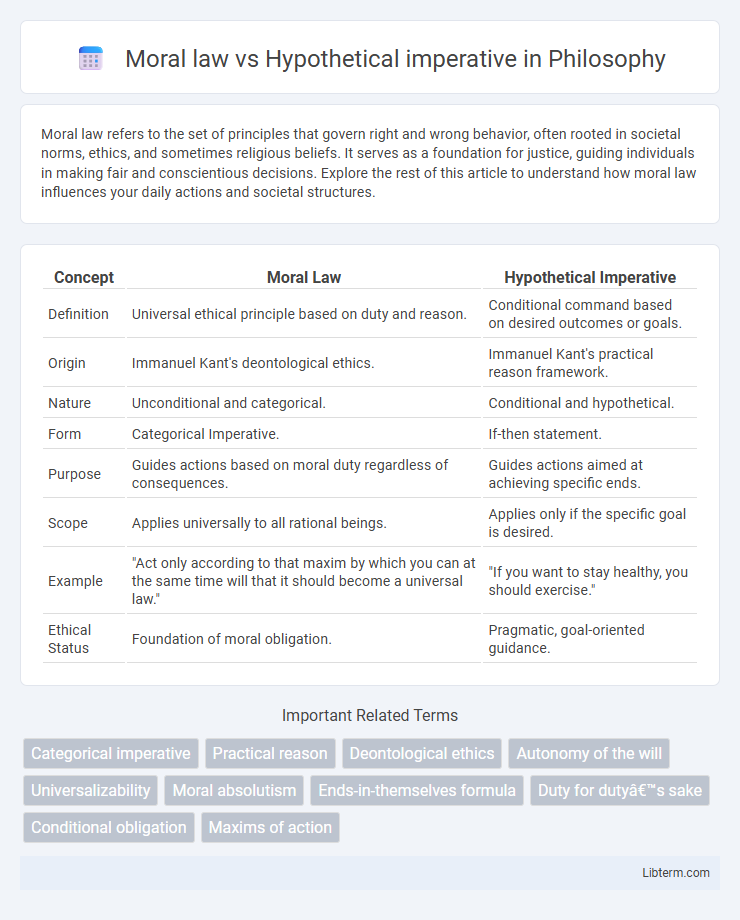Moral law refers to the set of principles that govern right and wrong behavior, often rooted in societal norms, ethics, and sometimes religious beliefs. It serves as a foundation for justice, guiding individuals in making fair and conscientious decisions. Explore the rest of this article to understand how moral law influences your daily actions and societal structures.
Table of Comparison
| Concept | Moral Law | Hypothetical Imperative |
|---|---|---|
| Definition | Universal ethical principle based on duty and reason. | Conditional command based on desired outcomes or goals. |
| Origin | Immanuel Kant's deontological ethics. | Immanuel Kant's practical reason framework. |
| Nature | Unconditional and categorical. | Conditional and hypothetical. |
| Form | Categorical Imperative. | If-then statement. |
| Purpose | Guides actions based on moral duty regardless of consequences. | Guides actions aimed at achieving specific ends. |
| Scope | Applies universally to all rational beings. | Applies only if the specific goal is desired. |
| Example | "Act only according to that maxim by which you can at the same time will that it should become a universal law." | "If you want to stay healthy, you should exercise." |
| Ethical Status | Foundation of moral obligation. | Pragmatic, goal-oriented guidance. |
Understanding Moral Law: Definition and Origins
Moral law, rooted in Immanuel Kant's philosophy, refers to universal principles that dictate actions based on duty and intrinsic moral worth, independent of personal desires or outcomes. Unlike hypothetical imperatives, which prescribe actions contingent on specific goals or conditions, moral law commands actions as necessary regardless of individual inclinations. Its origin lies in the concept of a priori knowledge, asserting that moral obligations are universally valid and discovered through reason alone.
What Is a Hypothetical Imperative?
A hypothetical imperative is a conditional command that applies only if one desires a particular outcome, such as "If you want to stay healthy, you should exercise." It contrasts with moral law, which Kant defines as an absolute, unconditional imperative bound by duty regardless of personal desires. Understanding hypothetical imperatives involves recognizing that they guide actions based on individual goals rather than universal ethical principles.
Kant’s Philosophy: Foundations of Moral Law
Kant's philosophy distinguishes moral law as a categorical imperative, an unconditional and universally binding command grounded in reason, contrasting with the hypothetical imperative which is conditional and dependent on personal desires or goals. The moral law demands actions be undertaken from duty and respect for the law itself, not contingent on outcomes or subjective inclinations. This foundational concept asserts that genuine morality requires adherence to principles that hold universally, independent of individual circumstances or objectives.
Key Differences: Moral Law vs. Hypothetical Imperative
Moral law, as defined by Immanuel Kant, is a universal and unconditional principle that dictates actions based on duty and intrinsic rightness, independent of personal desires or consequences. Hypothetical imperatives, in contrast, are conditional commands that prescribe actions as means to achieve specific goals or desires, depending on an individual's subjective interests. The key difference lies in moral law's absolute necessity and universality, while hypothetical imperatives are contingent and vary according to personal aims.
The Role of Duty in Moral Law
The role of duty in moral law is fundamental as it mandates actions based on moral obligations regardless of personal desires or outcomes, contrasting with hypothetical imperatives which are conditional and goal-oriented. Moral law, articulated by Immanuel Kant, requires adherence to principles that are universally binding, emphasizing duty as the intrinsic motivator for ethical behavior. This sense of duty ensures actions are performed out of respect for the moral law itself, rather than contingent on external factors or consequences.
Conditional Commands: The Nature of Hypothetical Imperatives
Hypothetical imperatives are conditional commands that dictate actions based on specific desires or goals, such as "If you want to stay healthy, exercise regularly." They depend on the subject's personal inclinations and are not universally binding, unlike moral laws grounded in unconditional principles. This conditional nature means hypothetical imperatives guide behavior only when the related outcome is sought or relevant.
Universalizability: A Test for Moral Law
Moral law, grounded in Kantian ethics, requires actions to be universally applicable, meaning one's maxims must be capable of becoming universal laws without contradiction. The test of universalizability ensures that moral imperatives hold consistently across all rational agents, distinguishing them from hypothetical imperatives, which depend on specific desires or goals. This universality criterion serves as a fundamental test for identifying genuine moral duties versus conditional, goal-dependent commands.
Practical Examples: Applying Both Concepts
Moral law, as defined by Immanuel Kant, demands actions based on universal maxims applicable to all rational beings, such as telling the truth regardless of consequences. In contrast, a hypothetical imperative depends on personal goals, for example, studying hard to pass an exam or working overtime to earn a bonus. Understanding these distinctions helps individuals make ethical decisions by recognizing when actions are guided by absolute moral duties versus contingent desires or objectives.
Criticisms and Limitations of Each Approach
Moral law, rooted in Kantian ethics, is often criticized for its rigid, absolute nature that can lead to conflicts between duties and overlook situational nuances. Hypothetical imperatives face limitations due to their conditional nature, which makes moral guidance contingent on personal desires rather than universal principles. Both approaches struggle to address complex ethical dilemmas where strict adherence to either moral law or conditional commands may result in impractical or morally problematic outcomes.
Relevance Today: Moral Law and Hypothetical Imperatives in Modern Ethics
Moral law, as formulated by Immanuel Kant, commands actions based on universal ethical principles regardless of personal desires, establishing a foundation for duty-bound decision-making in modern ethics. Hypothetical imperatives, by contrast, depend on individual goals and contingencies, guiding actions conditionally, which is prevalent in practical reasoning and policy-making today. Contemporary ethical discussions prioritize moral law for its role in upholding human rights and justice, while hypothetical imperatives inform pragmatic approaches in applied ethics and situational moral dilemmas.
Moral law Infographic

 libterm.com
libterm.com